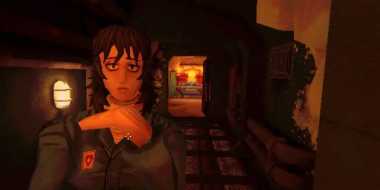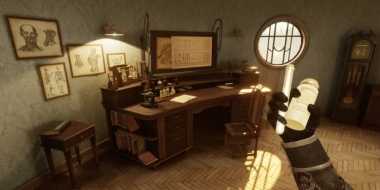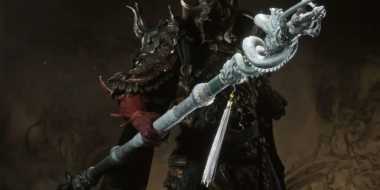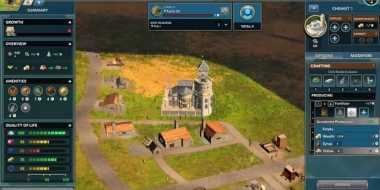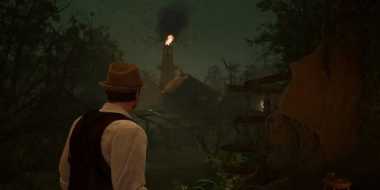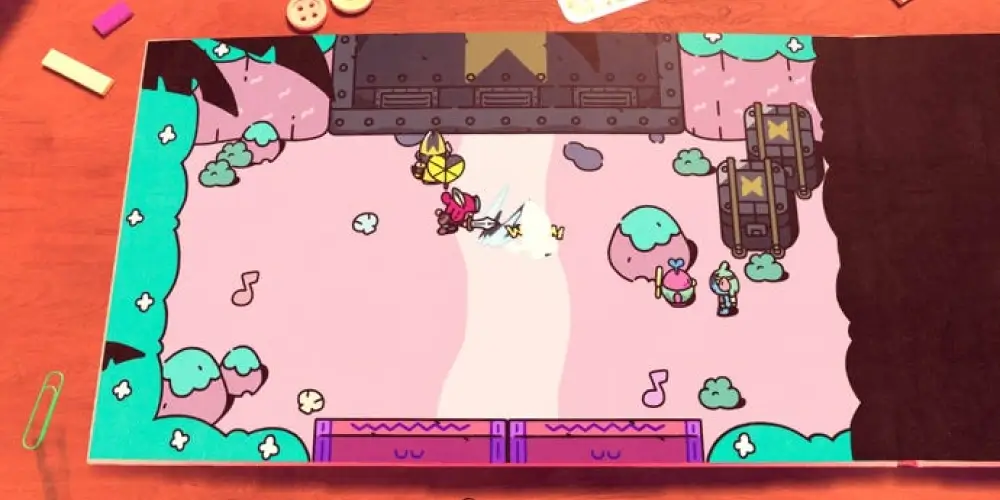

The Plucky Squire Review: A Charming Storybook Adventure, but Creativity is Held Back
20/09/2024 Maria Jones 1841
The Plucky Squire is an action-adventure game that immediately grabs your attention with its delightful blend of 2D and 3D platforming and gorgeous storybook visuals. It’s the kind of game that makes you smile as you hop out of a storybook to interact with illustrations on a coffee mug or solve puzzles with words lifted from the pages. While the game delivers plenty of charm and whimsy, it often feels like it’s holding back—giving you the tools to get creative, but never quite letting you go full "plucko mode."
At its heart, The Plucky Squire is a tale about Jot, a brave little adventurer, and his pals Violet and Thrash. They live inside a beautifully illustrated storybook, where each page flips to reveal their quest to defeat the evil wizard Humgrump. Humgrump’s villainy, however, isn’t confined to the pages—he uses some mysterious magic to pull Jot into the 3D world, setting the stage for the game’s unique 2D-to-3D platforming twist. From here, Jot must collect treasures in the real world to manipulate the storybook and put an end to Humgrump’s schemes.
The game’s storybook presentation is undeniably gorgeous. The way pages turn, the vibrant illustrations, and the smooth transitions between the 2D and 3D worlds all make for a visually stunning experience. It's like flipping through a kid’s book come to life, with playful narration guiding you through. If presentation were everything, The Plucky Squire would be a clear winner.
But beneath the surface, things get a little tricky. The game seems like it’s made for kids at first glance—its simple combat and light platforming suggest an approachable experience. Yet, it quickly ramps up in complexity, leaving you unsure of its target audience. One moment you're bashing enemies with ease, the next you’re scratching your head at puzzles that might stump even the most seasoned gamer.
And that’s where the game struggles—it’s caught between being a charming, easy-going adventure and a more nuanced, layered experience. It hands you clever mechanics like cutting words from sentences to solve puzzles, allowing you to manipulate the story. For example, you might cut out the word "cheese" to lure a rat out of its lair, or move between the 2D and 3D realms to interact with objects in new ways. These moments are brilliant, but they’re few and far between.
The real issue is that while you’re given powerful abilities, the game restricts how and when you can use them. Puzzles often feel like they have one predetermined solution, and the freedom to get creative is hampered by the game’s need to control the experience. There were multiple times where I thought I had come up with a clever solution, only to find out the game didn’t want me to approach the puzzle that way. It’s frustrating when you have tools that beg to be used creatively but are funneled into a narrow path.
The game's structure doesn’t help either. You explore different locations—a mountain filled with metal-loving mice, a beach with a shovel-obsessed bird named Tumbo, and an artsy world inspired by famous painters like Van Gogh and Picasso. These areas are cute and playful, but the puzzles within them are hit-or-miss. The 3D set pieces, which take place in a child's messy room, are a nice change of pace, but even they often feel undercooked or too simplistic.
Combat and platforming are fine, but nothing special. You bash enemies, dodge-roll to avoid attacks, and solve light environmental puzzles. However, The Plucky Squire doesn’t push these mechanics far enough to make them truly engaging. The boss fights, like a battle against an elven archer, are turn-based (cool concept), but they’re entirely on rails (less cool). Similarly, a galaxy-themed bullet hell segment feels more like a brief distraction than a fully fleshed-out challenge.
Where the game really shines is in its presentation and charm. It’s fun, it’s lighthearted, and it’s definitely going to appeal to players who are looking for something upbeat and visually delightful. But when it comes to the depth of gameplay, The Plucky Squire plays it too safe. The restrictive puzzle design and lack of creative freedom hold it back from being something truly magical.
In the end, The Plucky Squire is a charming, fun adventure that’s perfect for a casual playthrough. It has its moments of brilliance, especially when it lets you flex your word-cutting and page-flipping abilities, but it ultimately doesn’t give you enough room to fully explore your creativity. If you’re looking for a game that’s visually stunning and playful, The Plucky Squire delivers. Just don’t expect to flex your puzzle-solving muscles too much—it’s a game that’s more about following the story than rewriting it.
 Recent Blogs
Recent Blogs
Mouthwashing Review: A Twist ...
10/10/2024 3277
Pathologic 3 Announced with ...
08/10/2024 3080
Best Weapons in Black Myth: ...
06/10/2024 2306
Corporeal: A Horror Puzzle G ...
04/10/2024 1825
Ara: History Untold Review: ...
02/10/2024 2340
 Trending Blogs
Trending Blogs
Alone In The Dark Review
21/05/2024 3334
Larian Studios: Embracing N ...
05/08/2024 3329
Mouthwashing Review: A Twist ...
10/10/2024 3277
Pathologic 3 Announced with ...
08/10/2024 3080
Prince of Persia: The Lost Crown
25/05/2024 3043
